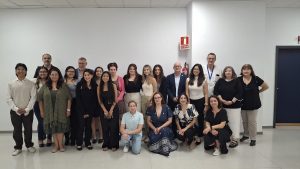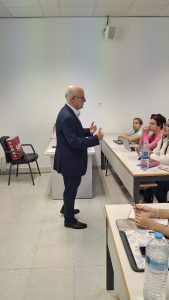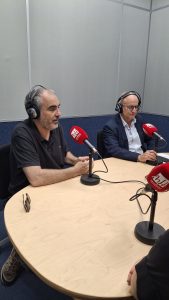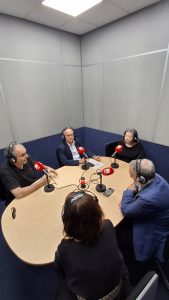Start to second edition of Medicine & Humanities Study Abroad program in collaboration with UTSA (USA)
4 June 2024
 Start to second edition of Medicine & Humanities Study Abroad program in collaboration with UTSA (USA)
Start to second edition of Medicine & Humanities Study Abroad program in collaboration with UTSA (USA)
Students from the University of Texas at San Antonio are already at work in the Balmis Building on the San Juan Campus in the first sessions of contextualization of Spanish culture and society
June 3, 2024
This morning, the second edition of the Medicine & Humanities Study Abroad program began with participation by 14 students from the University of Texas at San Antonio (UTSA) in the Francisco Javier Balmis Building on the San Juan Campus.
Participants in the act included Vice Rector for Internationalization and Cooperation, Vicente Micol; Vice Rector for Planning and Social Responsibility, Domingo Orozco; Director of the Service of International Relations, Development Cooperation and Volunteerism, Inmaculada Blaya; Deputy Vice Rector for International Projection and Communication, José Luis González-Esteban; UMH assistant professor, Carmen María López Rico; along with UTSA assistant professor and group leader, Melissa Wallace.
In today’s session given by López Rico, the UTSA students gained a first-hand appreciation of social, cultural, and economic contexts of Spain with activities that will continue through Thursday and for which they will visit the Alicante Memory Interpretation Center along with Spanish Civil War bomb shelters. Furthermore, during the second morning session, professor Melissa Wallace began her module of Specialized Linguistic Training in Healthcare.
For his part, Micol affirmed that “the UMH DNA is that of a young, entrepreneurial, innovative, close, and open university.” He also highlighted the role of primary care in the Spanish public healthcare system “with the objective that the students learn about it and can compare it with that in United States.” Along these lines, Domingo Orozco, accompanied by part-time lecturer, Juan Manuel Arriero, as lecturers for the Hospital Management module, highlighted the value of the public healthcare system in Spain by emphasizing primary care the innovative training for students in the healthcare field.
Furthermore, during a subsequent interview at Radio UMH, Wallace explained that UTSA students do things strategically and that “activities such as this study abroad provide them with an advantage when they begin looking for future work,” in addition to how “learning about different settings helps them enrich themselves.”
González-Esteban and Blaya also valued the participation for this edition and how they hope that the feedback will be as good as it was for the first edition and that this program by the Vice Rectorate for Internationalization and Cooperation become consolidated.
Program activities continue throughout the month
The US students will participate in four study abroad modules during the month of June. They address public health, hospital management, the Mediterranean diet, in addition to the mentioned introductory module on Spanish culture and society. This program also includes visits to and classes at the Elda Hospital, a cooking demonstration on the Elche Campus, tastings, and a cultural excursion to Granada to learn about that part of Spain. On their free days, the UTSA students will visit different points around the Valencian Community.


